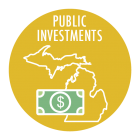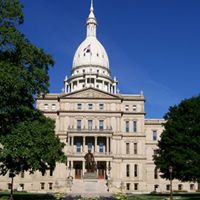
Bob Emerson and John Walsh in a guest column for Bridge lay out a set of principles that should guide Michigan policymakers as they deal with an unprecedented shortfall in state revenue this fiscal year and next. Worth reading!
Both are former legislators and state budget directors. Emerson is a Democrat, Walsh a Republican.
What I want to focus on in this post is their approach to revenue, or more bluntly raising taxes. And to focus on not further shredding the safety net when the inadequacy of the current Michigan safety net is crystal clear to everyone.
Emerson and Walsh ask “Given that budgets have two sides, income and expenditures, should we consider tax increases to help with the pending deficits?” They answer:
We believe it is premature to consider general tax increases to address the immediate deficit. Individuals have lost jobs and incomes, businesses have been temporarily closed, and some will never reopen. Now is not the time to burden individuals or businesses with the additional financial obligation any tax increase would impose.
To their credit, Emerson and Walsh make the case that preserving––if not expanding the safety net––should be a priority in deciding where to make budget cuts. They write:
We know that the pandemic has hit lower income and communities of color more severely, so we should also review our social safety net, understand its failings, and strengthen it where necessary. A thorough review should be made of federal waivers to maximize money coming into Michigan to support this safety net.
The reality is if you take raising taxes now off the table, it is almost certain that an already inadequate safety net will be shredded more. Leaving those who have been burdened most by the economic collapse with both a loss of employment income and benefits and a reduction in safety net income and benefits.
Emerson and Walsh argue that “Now is not the time to burden individuals or businesses with the additional financial obligation any tax increase would impose.” One can make a strong case that now also is not the time to burden individuals and businesses with the additional financial obligation any reduction in safety net benefits would impose.
Another reality of our pandemic-driven economy is that it is some, but not all, individuals who have lost jobs and incomes, and some, but not all, businesses who have been temporarily closed with some never reopening.
So if the goal is not burdening those individuals and businesses who have been harmed by the pandemic-driven economic collapse, raising taxes on those who have not been hurt economically in the collapse needs, at least, to be on the table.
Of course, as Emerson and Walsh, recommend we should eliminate spending on unnecessary activities, push for increased federal funding and use rainy day funds to shore up the safety net. But given the size and duration of the budget shortfall, it is not realistic to think you can without raising taxes provide the safety net benefits needed to help those individuals who, through no fault of their own, are bearing the brunt of the economic collapse.
As we explored previously the purpose of setting a state budget is not simply to reduce the deficit but to insure prosperity. If you use that frame, raising taxes must be on the table now.
Emerson and Walsh write “Given our caution about general tax increases in the short term because of the uncertain economic environment, we do believe that tax policy should be reviewed.” The mechanism Jim Blanchard used to consider tax policy in the severe economic downturn of the early Eighties was a bi-partisan blue ribbon commission. That commission recommended a combination of higher taxes and spending cuts temporarily to both balance the state budget and preserve prosperity.
Seems like now is the time to convene a similar group, hopefully with Emerson and Walsh as members, to recommend how the state can in this unprecedented economic downturn not simply reduce the deficit but insure prosperity.







